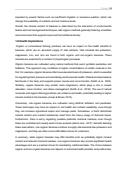Page |8 impacted by several factors such as insufficient irrigation or excessive weather, which can change the availability of nutrients and soil moisture levels. Overall, the mineral content of bananas is determined by the interaction of environmental factors and soil management techniques, with organic methods generally fostering a healthier soil environment that supports improved fruit nutritional density. 1.8 Health Implications Organic or conventional farming practices can have an impact on the health benefits of bananas, which are an abundant supply of vital nutrients. Vital minerals like potassium, magnesium, iron, and zinc are found in both organic and non-organic bananas. These minerals are essential for a number of physiological processes. Organic bananas are cultivated using natural methods that avoid synthetic pesticides and fertilizers. This approach may contribute to higher concentrations of certain minerals in the fruit. For example, organic bananas often have elevated levels of potassium, which is essential for regulating blood pressure and maintaining cardiovascular health. Potassium helps balance fluid levels in the body and supports proper muscle and nerve function (Smith et al., 2018). Similarly, organic bananas may contain more magnesium, which plays a role in muscle relaxation, nerve function, and stress management (Smith et al., 2018). The use of natural composts and organic farming practices can enhance soil health, potentially leading to higher mineral content in the bananas (Jones & Brown, 2019). Conversely, non-organic bananas are cultivated using artificial fertilisers and pesticides. These techniques may have an impact on soil health and nutrient availability, even though they can increase agricultural output and manage pests. Sometimes, a fruit's diminished mineral content and nutrient imbalances result from the heavy usage of chemical inputs. Furthermore, there is worry regarding possible pesticide chemical residues, even though these are controlled and usually exist in trace amounts (Harris et al., 2017). Not with standing these reservations, non-organic bananas continue to supply vital elements like potassium and magnesium, and they are often a more affordable choice for customers. In summary, while organic bananas may offer benefits such as potentially higher mineral content and reduced chemical residues, non-organic bananas also provide significant health advantages and are a practical choice for maintaining nutritional intake. The choice between organic and non-organic bananas can depend on individual health priorities and preferences.
